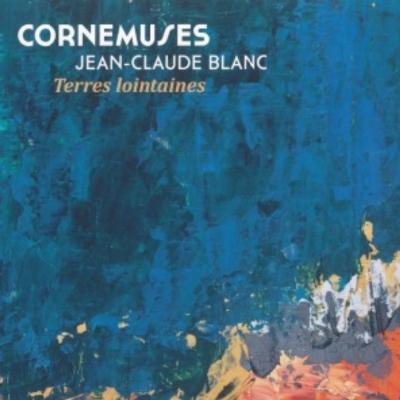The Bagpipe Society
CD Review - Jean-Claude Blank - Terre Lointaines
Jean-Claude Blanc - Terre Lointaines
Terre Lointaines is the second CD by Jean-Claude Blanc, one of the key pipers in the French piping revival, accompanied by his brother Bernard Blanc; one of the pipemaking fathers of that revival.

I reviewed his first CD, Cornemuses, for Chanter in 2018. This features a mix of music not only from central France, but also from further afield. His second CD Lointaines, meaning Distant Lands takes us completely away from France. Instead, he has cast his musical nets even wider than before, to create a glorious international melange. Armenian, Syrian, Sephardic, Catalonian and Swedish melodies from the past 10 centuries sit comfortably together. And he has now discovered a new and surprising Distant Land as a source for his bagpipe music… England! Who could have thought that the music of Orlando Gibbons, John Dowland and Henry Purcell would sit so well on the pipes? But they certainly do. The whole CD is awash with beguiling and haunting melodies. On all tracks, apart from one, Jean-Claude plays his chosen instrument, the low A cornemuse (26 pouce). This pipe is a big beastie with a majestic and haunting tone. He is a Master Piper, who has no need to impress the listener with the speed or cleverness of his playing.
What he does on each track is to bring out the beauty and grace of each melody that he plays. Audible proof of the old adage that “anyone can play a tune fast, but it takes a lot more skill to play it slowly.” He lets every single note of each melody ‘breathe’. All the right notes and all in the right order!
On five of the thirteen tracks, he is accompanied by his brother Bernard on A pipes, (14 pouce), an octave higher. They tend to start playing in unison, before breaking out into harmony, with tasteful use of vibrato. Listening to their playing is an inspiration and a testimony to their lifetime of playing together.
Other arrangements and accompaniments are minimal. In every case they provide exactly what is needed and no more, which leaves plenty of space for the pipers to explore the beauty of each melody. On some tracks Olivier Giteneait, plays either very tasteful alto sax or a cornemuse in D (20 Pouce) and Aloïs Gitenait plays a stately double bass. The new musical ingredient on this CD is the addition of the piano on three tracks, played by Jean-François Déat. I had always assumed that the mix of bagpipes and piano was a recipe for disaster and should never be attempted so I was surprised how beautifully they blended. Later I noticed on the liner notes that the piano was enregistré au diapason 44,5 Hz, et pour la partie avec cornemuse, au tempérament Erlangen (Anonymous < Pro clavichordiis facendis> XVème siècle). My French is a bit dodgy, but from this I understand that they have tuned the piano to a 15th century temperament that accords with the A drone. It works beautifully! It’s good at my time of life to find that one of my firmly held opinions is wrong!
Jean-Claude treats us to five melodies from the partnership of composers Gurdjieff and De Hartmann. I had only heard of George Gurdjieff, who died
in1949, as a mystic and spiritual teacher. But Wikipedia tells us that he was a Russian of Armenian and Greek descent who collaborated with Russian composer Thomas de Hartmann, to create melodies with roots in Caucasian and Central Asian folk and religious music. Certainly, all the melodies Jean-Claude has chosen have a haunting feeling to them which matches the profound character of the low A pipes and they nestle comfortably alongside other European tunes from the 10th and 11th century.
With 13 tracks and 18 melodies I find it hard to choose Favourite Tracks.
Certainly, Dance Sayyid, a melting and infectious waltz by Gurdjieff and De Hartmann, became an ‘ear worm’ for me earlier in the year. It features Jean-Claude accompanied by alto sax and double bass and I find it hard to believe that anyone, living or dead, would not be seduced by its charm. The solo Lamentations by Orlando Gibbons is for me as evocative and profound as any Regret that I have heard from the Auvergne. It leads on to the pleadingly haunting L’oi sacrée, accompanied by the piano. How blessed are Shepperds by Purcell is a stately arrangement with A and D pipes accompanied by alto sax and double bass.
The English bagpipe revival has been greatly inspired by the music and dance of the French revival. Many of us have loved and played this music from across the channel, so it’s a delicious reversal to find that one of the key figures of French piping has been standing on the other shore and looking towards us to find suitable music in places where most of us have never thought of looking!
I will finish this review once again by repeating that it would be wonderful if we could lure Jean-Claude and Bernard Blanc over the channel to play at The Blowout. Hands up who agrees with me?
CD available from jc.blanc2@wanadoo.fr and https://phonolithe.fr/
- Data Processing Notice (GDPR)
@BagpipeSociety on X (formally known as Twitter)
TheBagpipeSociety on Instagram
 BagpipeSociety on Facebook
BagpipeSociety on Facebook
Something wrong or missing from this page? Let us know!
